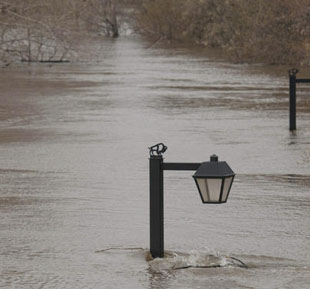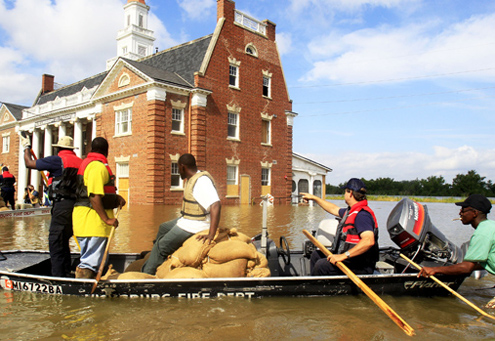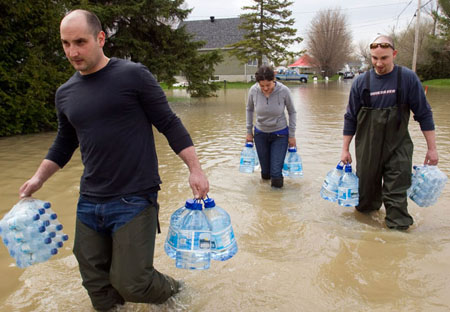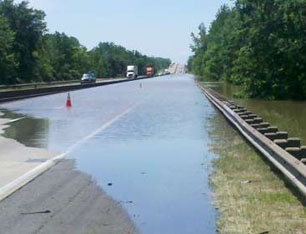Cry me a river .. why is flooding suddenly such a problem .. and for the economy too?
May 12th, 2011 | By L. Frank Bunting | Category: Key Current Issues
Lamp posts are almost completely submerged in the overflowing Assiniboine River in Brandon, Man., on Wednesday, May 11. The water is the highest it's been since 1882. DAVID LIPNOWSKI/THE CANADIAN PRESS.
Several years ago I was at a conference on Canadian disaster management, where provincial representatives agreed that flooding was a recurrent problem shared by everyone – and quite arguably the first priority for any joint cross-Canada disaster mitigation policy.
It never makes business sense to offer insurance against something almost bound to happen. And in Canada and the United States private flood insurance is very hard to come by. In the USA this has inspired the government-backed National Flood Insurance Program – a rare case where the land of the free has been more “socialistic” than its northern neighbour. (As a recent report has explained: “Canada is the only G8 country where flood insurance is not available to homeowners.”)
Yet even with all this history in mind, flooding at the moment, and in the more recent past, seems to have become an even bigger problem than usual. As I write, the Government of Manitoba is contemplating breaking a dike on the Assiniboine River and actually inducing allegedly moderate flooding in the area around the hamlet of Newton, to prevent more catastrophic flooding in other parts of the province. And: “As Manitoba prepares to open a floodgate in the midst of the Assiniboine River’s worst deluge in centuries, the province is turning for help to a forecasting veteran who thought he’d analyzed his last flood when he retired last year.”
This past Tuesday it was reported that: “As the flood waters of the Richelieu River [in Quebec] continued their slow retreat on Monday, questions surfaced about why people are allowed to build homes in regions where rivers regularly overflow their banks and the taxpayer is expected to pick up the cost of property damages as well as military and other government emergency services … Private insurers refuse to cover any area that is at risk of flooding, Jack Chardirdjian, of the Insurance Bureau of Canada, says.”

County crews head out on a boat on Wednesday, past a partially submerged building, as they prepare to sandbag areas on the levee to slow down floodwaters from the swollen Mississippi River in Vicksburg, Miss. (Sean Gardner/Reuters).
(So we don’t have a government-supported flood insurance program in Canada, as in the USA, but governments typically pick up the tab in the end anyway – which, like so much else these days, doesn’t make a lot of sense!)
Meanwhile: “A swell of water is moving down the Mississippi River, threatening a catastrophe not seen since the Great Mississippi Flood of 1927 …Â That event still ranks as one of the worst natural disasters in American history. In part, that flood catalyzed the mass migration of millions of African-Americans to northern cities, propelled Herbert Hoover to the presidency and set the stage for the Great Depression … For many, this flood will be worse … And in a nightmare scenario, it could damage significant sectors of the US economy, affecting investors everywhere in addition to those with homes and businesses in the South and Southeast.”
* * * *
All this raises an obvious question. Is there something in particular behind this wave of even more flooding than usual – in Canada and the United States and elsewhere? (Remember the Queensland floods in Australia, eg, just this past December and January? And then what about “the horrendous 2010 Pakistani floods [24 million homeless] and … the Brazil floods [500 dead, thousands homeless], Sri Lanka floods [23 dead, 1 million homeless] and Philippines floods [42 dead, 400,000 displaced]”?)

Mark Pesce, left, Karyne Roy and Mark Dolan, right, carry drinking water through the flooded streets along the Richelieu River in Saint-Blaise, Quebec, Friday, May 6, 2011. (Ryan Remiorz / THE CANADIAN PRESS).
Well, Dick Cheney may not agree. (Or the new Harper majority government in Ottawa?) But there is some increasing agreement elsewhere that “extreme precipitation events” are in the first instance behind recent hyper-flooding trends. And: “increased greenhouse gas (GHG) pollution leads successively to global warming, increased sea temperature, increased evaporation and thence to increased precipitation … Accordingly one cannot exclude the likelihood of a contribution of man-made global warming to extreme precipitation events.”
This past February George Monibot was more exactly reporting, in the Guardian across the sea in the United Kingdom, that: “Two new papers, published by Nature, should make us sit up, as they suggest for the first time a clear link between global warming and extreme precipitation (precipitation means water falling out of the sky in any form: rain, hail or snow).”
And then just yesterday Andrew Freedman was asking, on the “onearth” website, “High Waters: A Climate Connection to the Mississippi River Floods?” He writes: “Climate change cannot be blamed for causing the flooding.” That is more directly a result of “the heavy rain that fell during April in the Ohio Valley, where six states – Illinois, Indiana, Kentucky, Ohio, Pennsylvania, and West Virginia –Â recorded their wettest April since instrument records began 117 years ago. Nine states recorded their wettest February through April period on record … In addition, snowmelt from the Midwest added more water to the Mississippi River and its tributaries.”
At the same time, Freedman goes on: “scientists have detected large-scale trends indicating that extreme precipitation events are becoming more likely as temperatures warm in response to increasing amounts of greenhouse gases in the air. This means that heavy rainfall events are more frequent than they used to be, in part because a warmer atmosphere holds more moisture that can be wrung out by storm systems.”

Flooding on the White River required closing of Interstate 40 near DeValls Bluff, Arkansas. (SOURCE: U.S. Geological Services).
None of this is to suggest that the enthusiasm for some of the more controversial global warming mitigation policies – which has eroded over the past few years in the face of assorted ostensibly economic and other pressures – needs to be revived. But in both Canada and the United States we have lately abandoned many of the environmental concerns that seemed to be reaching new heights only a few years ago. It may be that various real-world extreme weather events over the next few years will force some further sober second thoughts about environmental policy, of one sort or another. At the moment even Fox News is reporting that “Flooding of Southern Farms Poised to Wreak Havoc on Economy.” (Oh and btw: “Gas Refiners Nervous Over Mississippi Flooding,” and Louisiana Governor Bobby Jindal is warning that, as a result of Mississippi flooding, “operations at two major refineries could be at risk affecting at least 75% of the refining rates at those two refineries.” And there’s another explanation for the rising costs of keeping your car on the road, with who knows just what broader implications for much-needed North American economic growth?)

